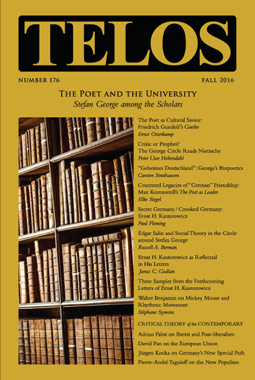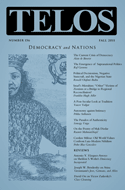By Telos Press · Thursday, December 31, 2020 In today’s episode of the Telos Press Podcast, Camelia Raghinaru talks with Loren Goodman about his article “Poetic Impositions: Japanese–U.S. Constitutional Problems of Peace and Tranquility,” from Telos 189 (Winter 2019). An excerpt of the article appears here. If your university has an online subscription to Telos, you can read the full article at the Telos Online website. For non-subscribers, learn how your university can begin a subscription to Telos at our library recommendation page. Purchase a print copy of Telos 189 in our online store.
Listen to the podcast here.
Continue reading →
 One often speaks of the importance of poetry for thought, even of poetry as a mode of thinking, and perhaps nowhere more than in Germany, the country of Dichter and Denker, of poets and thinkers. The German intellectual tradition is defined by a long, intimately interwoven relation between poetry and thought going back to the solidification of the Modern Age in the eighteenth century: Klopstock’s “Republic of Letters”; Goethe and Schiller’s Classicism, especially Schiller’s “aesthetic state”; Hölderlin’s “founding poets” and the centrality of poets in “the time of need”; Jena Romanticism’s inextricable relation between “Symphilosophie” and “Sympoesie”; Hegel’s definition of beauty as “the sensible shining forth of the idea”; and onward to this day. One often speaks of the importance of poetry for thought, even of poetry as a mode of thinking, and perhaps nowhere more than in Germany, the country of Dichter and Denker, of poets and thinkers. The German intellectual tradition is defined by a long, intimately interwoven relation between poetry and thought going back to the solidification of the Modern Age in the eighteenth century: Klopstock’s “Republic of Letters”; Goethe and Schiller’s Classicism, especially Schiller’s “aesthetic state”; Hölderlin’s “founding poets” and the centrality of poets in “the time of need”; Jena Romanticism’s inextricable relation between “Symphilosophie” and “Sympoesie”; Hegel’s definition of beauty as “the sensible shining forth of the idea”; and onward to this day.
Continue reading →
By Katarzyna Bałżewska · Thursday, March 31, 2016 This article presents the connections between the Polish poet Czesław Miłosz and Thomas Mann’s The Magic Mountain. Miłosz’s fascination with the German novel, which has its roots in the 1930s, changed profoundly over the decades. Not only did the poet ponder on the immense intellectual value of The Magic Mountain, but he also turned to it eagerly as a form of literary “substance” and inspiration for his own works (The Seizure of Power, A Magic Mountain). The novel left deep marks on the author of The Captive Mind, because throughout his whole life he sought references to his own life in the fictitious events and characters from Mann’s story. The chosen fragments of texts and conversations with the Polish poet enable us to investigate the history of the extraordinary connection between Miłosz and this twentieth-century epic masterpiece, indicating at the same time the key moments of this “literary relationship.”
Continue reading →
By Rusmir Mahmutćehajić · Tuesday, October 18, 2011 Rusmir Mahmutćehajić’s “On the Poetry of Mak Dizdar: The Poet, the Road, and the Word” appears in Telos 156 (Fall 2011). Read the full version online at the TELOS Online website, or purchase a print copy of the issue here.
 This essay investigates certain key ontological, cosmological, anthropological, and psychological aspects of Mak Dizdar’s Stone Sleeper, the best-known poetic work of the Slavic south. Written during the 1960s, the book was recognized immediately on publication as an authentic voice of perennial wisdom finding expression through major elements of Bosnian culture. Although distorted and obscured in modern ideological perspectives, the idea of “Bosnian Culture” preserves nearly all the vital elements of perennial wisdom. The poet’s confident expression of this wisdom is, in the author’s view, his witness to the need for dialogue between interlocutors of both the traditional and modern viewpoints that can assist our exit from confusion and ideological reductionism. In spite of its origins during the period of Communist totalitarianism, Stone Sleeper presents a clear picture of how human openness to the principle of existence, which transcends any and all ideological construction, is and remains irreducible to closed form. This book has been recognized as both a supreme achievement and a crucial moment in the poetry of the Slavic south, confirming Bosnia’s centrality to and rich impact upon that complex whole. This essay investigates certain key ontological, cosmological, anthropological, and psychological aspects of Mak Dizdar’s Stone Sleeper, the best-known poetic work of the Slavic south. Written during the 1960s, the book was recognized immediately on publication as an authentic voice of perennial wisdom finding expression through major elements of Bosnian culture. Although distorted and obscured in modern ideological perspectives, the idea of “Bosnian Culture” preserves nearly all the vital elements of perennial wisdom. The poet’s confident expression of this wisdom is, in the author’s view, his witness to the need for dialogue between interlocutors of both the traditional and modern viewpoints that can assist our exit from confusion and ideological reductionism. In spite of its origins during the period of Communist totalitarianism, Stone Sleeper presents a clear picture of how human openness to the principle of existence, which transcends any and all ideological construction, is and remains irreducible to closed form. This book has been recognized as both a supreme achievement and a crucial moment in the poetry of the Slavic south, confirming Bosnia’s centrality to and rich impact upon that complex whole.
Continue reading →
|
|

 This essay investigates certain key ontological, cosmological, anthropological, and psychological aspects of Mak Dizdar’s Stone Sleeper, the best-known poetic work of the Slavic south. Written during the 1960s, the book was recognized immediately on publication as an authentic voice of perennial wisdom finding expression through major elements of Bosnian culture. Although distorted and obscured in modern ideological perspectives, the idea of “Bosnian Culture” preserves nearly all the vital elements of perennial wisdom. The poet’s confident expression of this wisdom is, in the author’s view, his witness to the need for dialogue between interlocutors of both the traditional and modern viewpoints that can assist our exit from confusion and ideological reductionism. In spite of its origins during the period of Communist totalitarianism, Stone Sleeper presents a clear picture of how human openness to the principle of existence, which transcends any and all ideological construction, is and remains irreducible to closed form. This book has been recognized as both a supreme achievement and a crucial moment in the poetry of the Slavic south, confirming Bosnia’s centrality to and rich impact upon that complex whole.
This essay investigates certain key ontological, cosmological, anthropological, and psychological aspects of Mak Dizdar’s Stone Sleeper, the best-known poetic work of the Slavic south. Written during the 1960s, the book was recognized immediately on publication as an authentic voice of perennial wisdom finding expression through major elements of Bosnian culture. Although distorted and obscured in modern ideological perspectives, the idea of “Bosnian Culture” preserves nearly all the vital elements of perennial wisdom. The poet’s confident expression of this wisdom is, in the author’s view, his witness to the need for dialogue between interlocutors of both the traditional and modern viewpoints that can assist our exit from confusion and ideological reductionism. In spite of its origins during the period of Communist totalitarianism, Stone Sleeper presents a clear picture of how human openness to the principle of existence, which transcends any and all ideological construction, is and remains irreducible to closed form. This book has been recognized as both a supreme achievement and a crucial moment in the poetry of the Slavic south, confirming Bosnia’s centrality to and rich impact upon that complex whole. 

